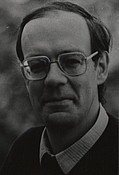Profiles of Leading Women Scientists on AcademiaNet.
Members
List of Members | Expert Search
Search among the members of the Leopoldina for experts in specific fields or research topics.

Bert Sakmann
Nobel Prize in Physiology or Medicine 1991
| Year of election: | 1993 |
| Section: | Genetics/Molecular Biology and Cell Biology |
| City: | Martinsried |
| Country: | Germany |
CV Bert Sakmann - English (PDF)
Research
Research Priorities: Patch clamp technique, signal transmission, learning and memory processes, cortical columns, techniques to measure signal-channel currents, functions of pre- and post-synaptic membranes, receptor channels, neuromuscular synapses, bioimaging of cerebral cortex structures
Bert Sakmann is a German physician and neurobiologist. He and the German biophysicist Erwin Neher were jointly awarded the Nobel Prize in Physiology or Medicine in 1991. The two researchers developed the “patch clamp technique”, with which they managed to prove the existence of ion channels in cell membranes. These channels play an important role in signal transmission. Recently, Bert Sakmann has been studying the functional anatomy of circuits in the cerebral cortex to better understand how the circuit changes during learning and memory processes.
The patch clamp technique is an electrophysiological measuring technique with which minute amounts of current flowing in and between living cells can be measured. It meant that the properties of even a single ion channel could be studied. Thanks to this extremely sensitive measurement technique, Sakmann and Neher managed to prove that, in almost all cell types, charged elements from within cells enter the surrounding environment via ion channels and thus regulatory functions are fulfilled. This was an important discovery for medicine, as further research showed that the cause of many diseases such as nerve or muscle pain and epilepsy resides in dysregulation of the flow of ions.
Most recently, Bert Sakmann and his team have been investigating the functional anatomy of circuits in the cerebral cortex. These circuits are responsible for various types of behaviour, such as decision-making. The question is how these circuits change during learning and memory processes. Sakmann’s working group have also managed to create, for the first time, a 3D reconstruction of a cortical column – an elementary building block of the cerebral cortex – from a rodent. This represents an important step towards a complete computer model of the brain.
Career
- 2009-2011 Scientific Director, Max Planck Institute for Neuroscience, Jupiter, USA
- since 2008 Head, Emeritus Group “Cortical column in silico”, Max Planck Institute of Neurobiology, Martinsried, Germany
- 1991 Professor, Faculty of Biology, Heidelberg University, Heidelberg, Germany
- 1990 Professor, Faculty of Medicine, Heidelberg University, Heidelberg, Germany
- 1989-2008 Director, Department of Cell Physiology, Max Planck Institute for Medical Research, Heidelberg, Germany
- 1987-1989 Professor, Faculty of Medicine, University of Göttingen, Göttingen, Germany
- 1985 Director, Department of Cell Physiology, Max Planck Institute for Biophysical Chemistry, Göttingen, Germany
- 1983 Head, Working Group for Membrane Physiology, Max Planck Institute for Biophysical Chemistry, Göttingen, Germany
- 1981 Habilitation, Faculty of Medicine, University of Göttingen, Göttingen, Germany
- 1979-1982 Research Associate, Group Membrane Biology, Max Planck Institute for Biophysical Chemistry, Göttingen, Germany
- 1974-1979 Research Assistant, Department of Neurobiology, Max Planck Institute for Biophysical Chemistry, Göttingen, Germany
- 1974 Doctorate, Faculty of Medicine, University of Göttingen, Göttingen, Germany
- 1971-1973 British Council Fellow, Department of Biophysics, University College London, London, UK
- 1969-1970 Research Assistant, Department of Neurophysiology, Max Planck Institute of Psychiatry, Munich, Germany
- 1968-1970 Physician in Internship, Universitätsklinikum München, Munich, Germany
- 1967 State Examination in Medicine, Ludwig-Maximilians-Universität (LMU) München, Munich, Germany
- 1964 Preliminary Examination, Eberhard Karls Universität Tübingen, Tübingen, Germany
- 1962-1967 Degree in Medicine, Eberhard Karls Universität Tübingen, Albert Ludwigs Universität Freiburg, LMU München, and Berlin, Germany as well as Paris, France
Honours and Memberships
- since 1995 Member, Order Pour le Mérite for Sciences and Arts, Federal President, Germany
- since 1993 Member, German National Academy of Sciences Leopoldina, Germany
- 1991 Nobel Prize in Physiology or Medicine (jointly with Erwin Neher), Nobel Assembly, Karolinska-Institute, Stockholm, Sweden
- 1991 State Research Prize, Baden-Württemberg Ministry of Science, Research and the Arts, Baden-Württemberg, Germany
- 1991 Ralph W.Gerard Prize, Society for Neuroscience, Washington D.C., USA
- 1991 Harvey Prize, Technion, Haifa, Israel
- 1991 Carus Medal, German National Academy of Sciences Leopoldina, Germany
- 1990 Ernst Hellmut Vits Prize, Münster University, Münster, Germany
- 1989 Canada Gairdner International Award, Gairdner Foundation, Toronto, Canada
- 1988 Member, Bavarian Academy of Sciences and Humanities, Bavaria, Germany
- 1988 Louis Jeantet Prize, Louis Jeantet Foundation, Geneva, Switzerland
- 1986 Gottfried Wilhelm Leibniz Award, German Research Foundation (DFG), Germany
- 1986 Louisa Gross Horwitz Prize, Columbia University, New York City, USA
- 1984 Zottermann Prize, Swedish Physiological Society, Sweden
- 1984 Adolf Fick Prize, Julius-Maximilians-Universität of Würzburg, Würzburg, Germany
- 1983 Spencer Award, Columbia University, New York City, USA
- 198 Magnes Award, Magnes Foundation, Jerusalem, Israel
- 1979 Feldberg Prize, Feldberg Foundation, London, UK
- 1977 Nernst Prize, German Bunsen Society for Physical Chemistry (DBG), Germany
- Member, Göttingen Academy of Sciences and Humanities, Göttingen, Germany
- Member, Heidelberg Academy of Sciences and Humanities, Heidelberg, Germany
- Member, National Academy of Sciences, USA
- Member, Royal Society, UK

